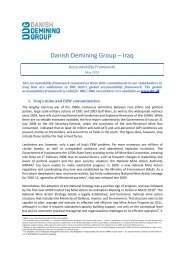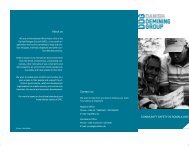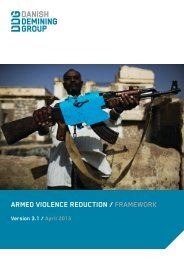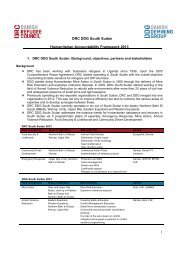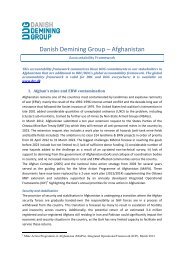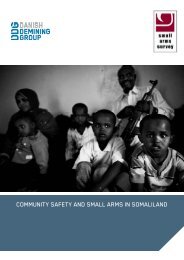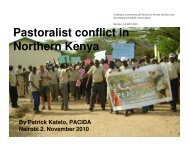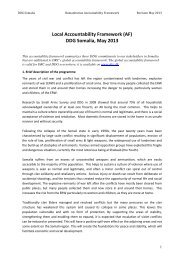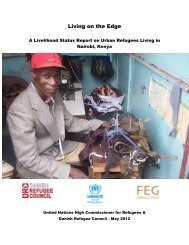22 DRC / DANISH REFUGEE COUNCILoverlooked in <strong>the</strong> KIS context, it will be considered in <strong>the</strong> light of its effects on health and security.On <strong>the</strong> o<strong>the</strong>r hand, several studies have underlined <strong>the</strong> potential impact of cash programming onchildren’s wellbeing through conditional programmes for education and health 22 . Low schoolattendance, child labour and high health concerns were observed as central both in <strong>the</strong> quantitativeand qualitative data. These three protection concerns will <strong>the</strong>refore be addressed in <strong>the</strong> light of <strong>the</strong>situation in <strong>the</strong> KIS – taking into account factors preventing households from correctly addressing<strong>the</strong>m, and <strong>the</strong> diversity of situations according to camps and communities.Health: One of <strong>the</strong> main findings of this study was <strong>the</strong> high exposure to health problems ofinhabitants in <strong>the</strong> surveyed KIS, and increased vulnerability due to economic barriers to access toquality health care. High levels of debts were identified both as a consequence of necessaryexpenses for health care, and an aggravating factor fur<strong>the</strong>r impeding improvement of healthconditions. Insalubrious living conditions causing recurrent health complications, limited access toquality health services, and high levels of indebtedness aggravating both factors, were found to bevulnerabilities specific to <strong>the</strong> KIS sites visited. Out of <strong>the</strong> surveyed sampling for this study, 81%respondents correspond to <strong>the</strong> extremely vulnerable individuals (EVI) standards developed byUNHCR. The higher degree of vulnerability of IDPs in Afghanistan, and in urban settings in particular,has already been underlined in previous research, and IDPs households in Kabul identified as morelikely to fall in <strong>the</strong> EVI category. This is notably <strong>the</strong> case for chronicle illness, physical disabilities andmental illness (respectively 18%, 14% and 5% of <strong>the</strong> members of <strong>the</strong> households in <strong>the</strong> sample forthis study).Affordability: The study found that <strong>the</strong> issue is less one of access to health services than thatof <strong>the</strong> quality and affordability of services. Most respondents to <strong>the</strong> survey and participants inFGDs in <strong>the</strong> KIS sites visited had access to ei<strong>the</strong>r public health facilities, or free medicalhealthcare and medicines provided by <strong>the</strong> WeltHungerHilfe. However qualitative data foundmost families interviewed are more likely to seek medical care in private clinics, withsubsequent indebtedness and distress sales to provide for medical expenses.Consequences are household’s resort to health care only as a last option, with potentialnegative impacts on validity, morbidity, and capacity of household members to activelycontribute to <strong>the</strong> family’s income.“If it's a serious matter, <strong>the</strong>n I go to <strong>the</strong> hospital. I borrow <strong>the</strong> money from relatives. But if <strong>the</strong>sickness is not that serious I treat it myself. I use traditional medicines. The clinic used to give usgood medicines, but nowadays <strong>the</strong>y only give really bad quality medicines. I borrow <strong>the</strong> money, sellmy blankets or even sometimes sell some food items. I am obligated to do that because I don't haveenough money”- (Female participant FGD Parwan 2, 50 years old)Health and Debts: One of <strong>the</strong> main running <strong>the</strong>mes of this study is <strong>the</strong> relationship betweenlevels of indebtedness and seeking health care. A recurrent statement in focus groupdiscussions was that households primarily resort to loans from relatives or neighbours forhealth purposes, mainly due to <strong>the</strong>ir incapacity to put aside money for health needs or toplan for external shocks such as sudden illness. Participants in FGDs also <strong>report</strong>ed thatselling in-kind assistance provided by aid agencies was a common way to pay for <strong>the</strong>irmedical bills. Likewise, in <strong>the</strong> quantitative survey, 33 % of <strong>the</strong> surveyed respondentsmentioned systematically seeking health facilities when faced with a problem, 17% <strong>report</strong>eddoing so often, and 39% seeking medical care only if <strong>the</strong>y had enough money. Overallapproximately 89% of our respondents <strong>the</strong>refore indicated a strong interest in medical care.However, quantitative data collected showed an inverse correlation between <strong>the</strong> level ofindebtedness of households and <strong>the</strong>ir attendance of health facilities in case of unexpectedillness: 47% of <strong>the</strong> indebted respondents surveyed mentioned seeking health care facilities22 cf, among p<strong>the</strong>rs: World Bank (2012) Can Cash Transfers Help Children Stay Healthy? The Human Development Network ;MACOURS K., SCHADY N., VAKIS R. (2011) Cahs Transfers, Behavioral Changes and Cognitive Development in EarlyChildhood: Evidence From a <strong>Read</strong>mozed Experiment, Human Capital and Economic Opportunity Working Group,EconomicReserach Center, University of Chicago. ; CONWAY, A., and GREENSLADE, M. (2011), Cash Transfers: Literature Review,DFID Policy Division.
CASH PROGRAMME REVIEW FOR IDPs IN KABUL INFORMAL SETTLEMENTS 23only if <strong>the</strong>y have enough money for medical expenses, and 28 % whenever <strong>the</strong>y are facedwith unexpected illness. For households who stated not being indebted, <strong>the</strong> proportions arerespectively 8% and 55%.Graph 4: Seeking medical care for health issues (%)We never go to hospitals or clinics for medicalcare.1%We rarely go to hospitals or clinics fortreatment.10%Sometimes: Only when we have enoughmoney for medical expens39%Usually: Most of <strong>the</strong> time when we fall ill.17%Always: Every time when we fall ill.33%,0 10,0 20,0 30,0 40,0 50,0Our findings <strong>the</strong>refore suggest levels of indebtedness have an impact on household’s behaviourtowards seeking health facilities. Fur<strong>the</strong>rmore, when asked about <strong>the</strong>ir spending preferences if <strong>the</strong>ywere to be provided with cash assistance, 33% of indebted respondents stated <strong>the</strong>y intended tospend cash assistance directly on health care, underlining <strong>the</strong> potential role of cash-approach inhelping indebted households to overcome economical barriers to access health facilities. Amongmany o<strong>the</strong>r cases, a female respondent in Rahman-Mina Qala-e Barqi underlined <strong>the</strong> potentialimpact of cash to overcome economic barriers to access to health services: “If I received cashassistance,it would be better. I could purchase everything I wanted with that money, and I could alsopay off my debts for <strong>the</strong> money I borrowed for my medical treatment”.Health and Hygiene: Lack of proper housing in <strong>the</strong> KIS induce poor health conditions. FGDparticipants <strong>report</strong>ed repeated child illnesses due to cold wea<strong>the</strong>r in <strong>the</strong> winter and exposureto high temperatures in <strong>the</strong> summer. High mortality of children and women during <strong>the</strong> harshwinter of 2011-2012 was also repeatedly brought up in FGDs, and directly related to poorhousing conditions.“I had food in <strong>the</strong> last winter, but I didn’t have fuel, so <strong>the</strong> winter was very cold, and my childrenwere crying all <strong>the</strong> night because of <strong>the</strong> cold rooms, and my children were sick <strong>the</strong> entire winter”- Female FGD Sharak- e Police, 30 years oldHousing: Given <strong>the</strong> informal and irregular nature of <strong>the</strong> settlements, <strong>the</strong> issue of access to land and<strong>the</strong> right to settle is particularly sensitive in KIS. According to both quantitative and qualitative dataga<strong>the</strong>red for this study, temporary land/space acquisition was mentioned as a serious year-roundneed and inadequate housing as a source of difficulties, with repercussions on access to drinkingwater, sanitation, and overcrowding of cramped housing space. More than 70% of respondentsmentioned additional space, proper infrastructure and land as <strong>the</strong>ir preferred form of assistance toimprove <strong>the</strong>ir shelter, aside from cash. As shown by a recent NRC/IDMC/JIPS/Samuel Hall study on<strong>the</strong> challenges of IDP Protection in Afghanistan 23 , which identified housing land and property (HLP)as one of <strong>the</strong> three top protection priorities for IDPs, HLP issues are related to broader durable23 NRC/IDMC/JIPS/SAMUEL HALL CONSULTING (2012), Challenges of IDP protection in Afghanistan: Research study on <strong>the</strong>protection of internally displaced persons in Afghanistan.



